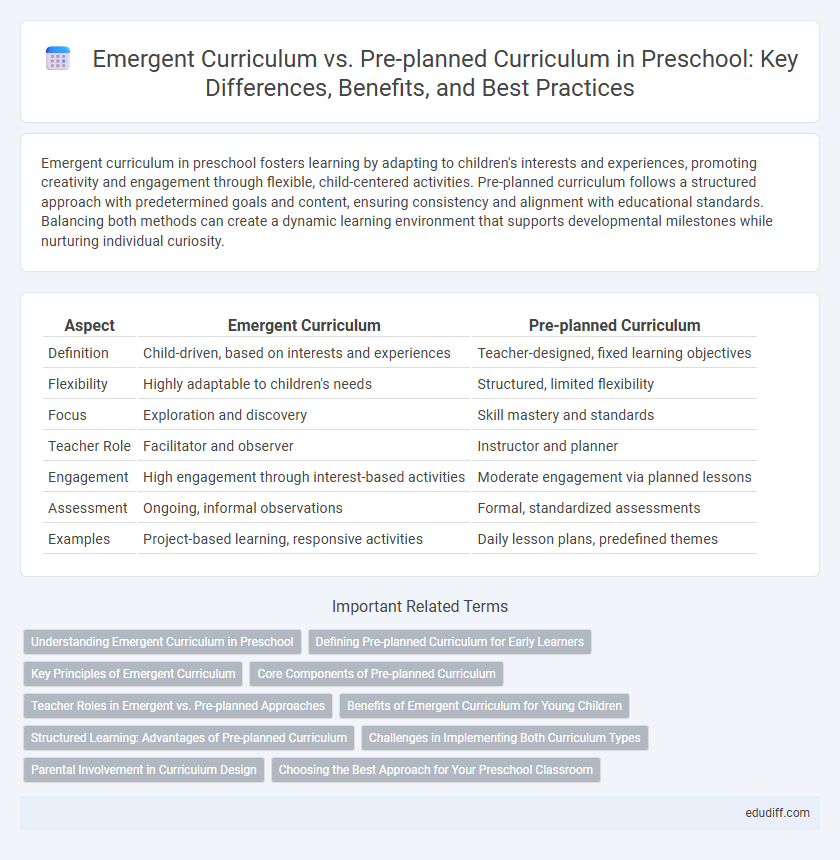Emergent curriculum in preschool fosters learning by adapting to children's interests and experiences, promoting creativity and engagement through flexible, child-centered activities. Pre-planned curriculum follows a structured approach with predetermined goals and content, ensuring consistency and alignment with educational standards. Balancing both methods can create a dynamic learning environment that supports developmental milestones while nurturing individual curiosity.
Table of Comparison
| Aspect | Emergent Curriculum | Pre-planned Curriculum |
|---|---|---|
| Definition | Child-driven, based on interests and experiences | Teacher-designed, fixed learning objectives |
| Flexibility | Highly adaptable to children's needs | Structured, limited flexibility |
| Focus | Exploration and discovery | Skill mastery and standards |
| Teacher Role | Facilitator and observer | Instructor and planner |
| Engagement | High engagement through interest-based activities | Moderate engagement via planned lessons |
| Assessment | Ongoing, informal observations | Formal, standardized assessments |
| Examples | Project-based learning, responsive activities | Daily lesson plans, predefined themes |
Understanding Emergent Curriculum in Preschool
Emergent curriculum in preschool prioritizes children's interests, ideas, and experiences as the foundation for planning learning activities, fostering engagement and deeper understanding. This approach encourages flexibility and responsiveness, allowing educators to adapt teaching based on observation and ongoing assessment of each child's development. Unlike pre-planned curriculum, emergent curriculum supports creativity, collaboration, and critical thinking by integrating real-life contexts and promoting exploration.
Defining Pre-planned Curriculum for Early Learners
Pre-planned curriculum in early childhood education involves a structured framework with predetermined goals, activities, and learning outcomes tailored to preschoolers' developmental milestones. This approach emphasizes consistency, allowing educators to systematically address cognitive, social, and motor skills through age-appropriate lessons. By aligning with educational standards, pre-planned curriculums provide measurable progress indicators for early learners.
Key Principles of Emergent Curriculum
Emergent Curriculum prioritizes child-led exploration, emphasizing flexibility and responsiveness to children's interests, fostering engagement and deeper learning. Key principles include observation-based planning, collaboration with children and families, and integrating real-life experiences to enhance developmental outcomes. Unlike pre-planned curricula, Emergent Curriculum adapts continuously to children's evolving needs and promotes creativity and critical thinking in preschool education.
Core Components of Pre-planned Curriculum
Pre-planned curriculum in preschool education emphasizes structured learning through defined objectives, sequenced activities, and standardized assessment methods to ensure consistent developmental milestones. Core components include a fixed schedule, teacher-directed lessons, and specific learning outcomes aligned with state or national standards to guide early childhood instruction. This approach supports measurable progress and accountability while providing clear guidance for educators and caregivers.
Teacher Roles in Emergent vs. Pre-planned Approaches
Teacher roles in emergent curriculum prioritize observation, responsiveness, and facilitation, guiding learning based on children's interests and spontaneous inquiries. In contrast, pre-planned curriculum requires teachers to implement structured lesson plans and maintain adherence to specific learning objectives and timelines. The emergent approach fosters a collaborative and adaptive classroom environment, while the pre-planned method emphasizes consistency and predictable outcomes.
Benefits of Emergent Curriculum for Young Children
Emergent curriculum fosters creativity and critical thinking by allowing preschool children's interests and experiences to shape learning activities, promoting deeper engagement and motivation. This child-centered approach supports social-emotional development by encouraging collaboration and communication among peers through natural exploration. Teachers can tailor lessons to individual needs, enhancing cognitive growth and ensuring meaningful, relevant learning outcomes.
Structured Learning: Advantages of Pre-planned Curriculum
Pre-planned curriculum offers structured learning with clearly defined objectives that ensure consistent skill development across all preschool students. It allows educators to systematically assess progress and adjust instruction based on measurable outcomes, fostering academic readiness. This approach also facilitates resource planning and time management, optimizing classroom efficiency and stability.
Challenges in Implementing Both Curriculum Types
Emergent curriculum presents challenges in requiring teachers to remain highly flexible and responsive to children's interests, often demanding extensive observation and planning time. Pre-planned curriculum struggles with limited adaptability, making it difficult to address diverse learning needs and spontaneous classroom dynamics effectively. Balancing structure with responsiveness is a core challenge in implementing both curriculum types in preschool settings.
Parental Involvement in Curriculum Design
Emergent curriculum actively incorporates parental input by encouraging caregivers to share their children's interests, cultural backgrounds, and home experiences, fostering a personalized and dynamic learning environment. In contrast, pre-planned curriculum typically follows a fixed schedule with limited opportunities for parental collaboration, focusing on standardized educational goals. Engaging parents in emergent curriculum design enhances children's development through meaningful connections between home and school settings.
Choosing the Best Approach for Your Preschool Classroom
Emergent curriculum in preschool emphasizes child-led exploration and adapts to children's interests, fostering creativity and engagement. Pre-planned curriculum provides structured learning objectives and consistent routines, ensuring coverage of essential developmental milestones. Selecting the best approach depends on your classroom's goals, balancing flexibility with targeted skill-building to support holistic early childhood development.
Emergent Curriculum vs Pre-planned Curriculum Infographic

 edudiff.com
edudiff.com